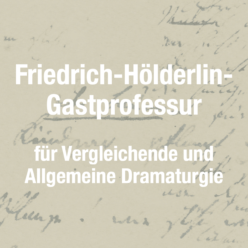Drama/Theatre/Performance and Philosophy: The Logic of/in Tragedy
Mittwoch, 14-16 Uhr, Raum 1.411, IG Farben-Haus, Campus Westend
This seminar will examine the relationships between the discursive practices of Drama/Theatre/Performance and Philosophy, in particular with regard to how logical arguments have been embedded within the narrative structures and the dramatic situations in tragedy. The seminar will focus on Sophocles’ three Theban plays: Antigone, Oedipus Tyrannus and Oedipus at Colonus and a selection of plays by Ibsen and Strindberg. The seminar will begin by raising general issues with regard to the interactions between the discursive practices of Performance and Philosophy.
Following this introduction the seminar will explore how tragedies can be characterized in terms of how they contextualize complex logical arguments, where at crucial turning-points the laws of logic are challenged. The dialectical tensions between logic and human nature – and what it means to be human – are a crucial component of Sophoclean tragedy, and these tensions are frequently formulated as riddles and as oracular or prophetic statements. The Chorus also has a crucial role for unfolding and challenging the laws of logic and their contextualizations. The complex relations between Aristotle’s Poetics and his theory of logic will also be carefully studied.
In addition to the analysis of the three Classical plays, modern and contemporary interpretations and adaptations of these plays will be presented and discussed from a dramaturgical perspective, examining in particular Brecht’s adaptation of the Hölderlin translation of Antigone which he directed in Switzerland and Berlin after the Second World War, and after which Antigonemodell 1948 was published, documenting this production. This was the first Modellbuch on the basis of which Brecht and his collaborators developed a new concept for documenting performances. Brecht’s Lehrstücke, which were written as he and Walter Benjamin had become close friends will also be examined in this broader context.
